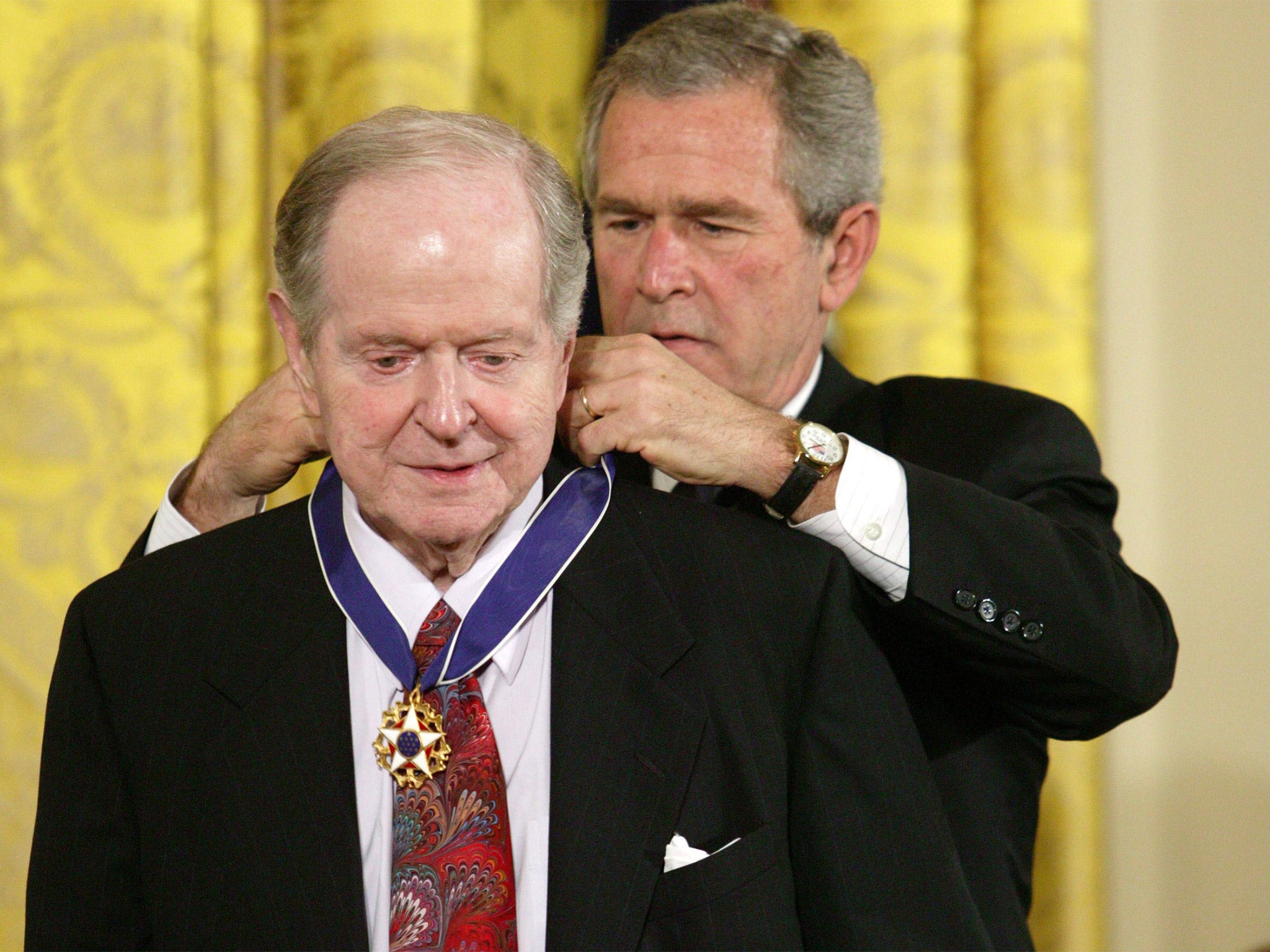Robert Conquest: Revered historian and poet who was the first to catalogue the full horrors of the Stalinist purges of the 1930s
Conquest's magnum opus, The Great Terror: Stalin's Purge of the Thirties, was the first to clearly show how the Soviet leader carried out mass murder

Robert Conquest was a Sovietologist and historian renowned for his work on exposing Stalin's slaughter of up to 15 million of his own citizens. His magnum opus, The Great Terror: Stalin's Purge of the Thirties, published in 1968, was the first to clearly show how the Soviet leader carried out deliberate mass murder.
Conquest was born in Great Malvern, Worcestershire in 1917. His father was an American of independent means who served in the Ambulance Corps during the First World War. He went up to Oxford in 1937, where he read philosophy, politics and economics and joined the Communist Party of Great Britain.
When war broke out, he was commissed into the Oxford and Buckinghamshire Light Infantry, later moving to the Intelligence Corps, where he was posted to Sofia to provide liaison between British and Bulgarian forces under Soviet command. Following the war, he continued to work in Sofia with the Foreign Office until the mid-Fifties.
Conquest already had wide-ranging interests in many areas of writing. Prior to publishing on Soviet history, he had already become a successful poet and literary editor. A member of the Movement poets of the 1950s, his contemporaries included Philip Larkin, Thom Gunn and Kingsley Amis, whom he met when Amis was writing Lucky Jim.
He edited two of the Movement's New Lines collections and published two significant anthologies of his own work, Between Mars and Venus (1962) and Arias from a Love Opera (1969). His poem "George Orwell", from 1969, begins:
Moral and mental glaciers melting slightly Betray the influence of his warm intent. Because he taught us what the actual meant The vicious winter grips its prey less tightly
Conquest's first major academic work, Power and Policy in the USSR (1961), was published during his research fellowship at the London School of Economics (LSE). Then, during the "Khrushchev Thaw" period of 1956-1964, Conquest gained access to information released by government departments about Stalin's atrocities. It was a research project which would define his future career.
The Stalinist show trials of 1937-1939, of disgraced leaders such as Grigory Zinoviev – former head of the Communist International – and Nikolai Bukharin, were already well-documented. Lesser known, outside the world of a few specialist academics, were the executions of Communist Party members, government officials and Red Army officers authorised by Stalin. Conquest showed – through official records, the first-hand testimonies of survivors and many other sources – how the purges had been carried out and subsequently concealed by Stalin's regime.
Examples of Stalin's behaviour documented by Conquest included one day, 12 December 1937, when he and Molotov personally approved 3,167 death sentences – and then went to the cinema.
Yet, despite Conquest's compelling research and crystal-clear accounts, there still remained revisionists who doubted the truth of what had been exposed. However, as Conquest explained in a later interview, "I think there are people everywhere who are committed to think things which aren't true. This doesn't only apply to this – it applies to dozens of things. There are Stalin deniers in general."
Conquest's The Great Terror: A Reassessment (1990) was a revised version of his 1968 book, updated after Conquest had been given access to recently opened Soviet archives, which backed up the conclusions of his earlier work. "One of the few unalloyed pleasures of old age is living long enough to see yourself vindicated," noted Michael Ignatieff in a review of this book. "Robert Conquest is currently enjoying this pleasure."
Estimates vary of the total number of people killed during Stalin's rule. Conquest himself at first put the figure at around 20 million. His most recent estimation was published in the 40th anniversary edition of The Great Terror, in which he writes: "Exact numbers may never be known with complete certainty, but the total deaths caused by the whole range of the Soviet regime's terrors can hardly be lower than some 13 to 15 million."
Conquest followed the worldwide success of The Great Terror with The Harvest of Sorrow: Soviet Collectivization and the Terror-Famine, published in 1986. In it he documented how the Soviet Communist Party attacked some two millions peasants, labelled "kulaks" by Stalin, whom the leader saw as well off and therefore enemies of the people. The peasants had their land stolen and many were sent to camps in Siberia.
Aside from his work in poetry and academia, he also published two works of fiction, A World of Difference (1955) and The Egyptologists (1965), co-authored with Kingsley Amis. He was appointed OBE in 1955 and CMG in the 1996 New Year's Honours for services to international affairs. He received the US Presidential Medal of Freedom in 2005.
Conquest continued to write into his nineties. The 200-line poem, "Getting On", published in 2010, is a touching commentary on life, sex and love and the depredations of old age. It begins:
Into one's ninetieth year.
Memory? Yes, but the sheer
Seethe as the half-woken brain's
Great gray search-engine gains
Traction on all one's dreamt, seen, felt read,
Loathed, loved...
Conquest counted among his many friends the late Christopher Hitchens, who dedicated Orwell's Victory to Conquest, as the "premature anti-fascist, premature anti-Stalinist, poet and mentor, and founder of 'the united front against bullshit.'"
Marcus Williamson
George Robert Acworth Conquest: writer, poet and historian: born 15 July 1917; married first Joan Watkins (two sons); second Tatiana Mihailova; third Caroleen McFarlane; fourth Elizabeth Neece; died Stanford, California 3 August 2015.
Join our commenting forum
Join thought-provoking conversations, follow other Independent readers and see their replies
Comments